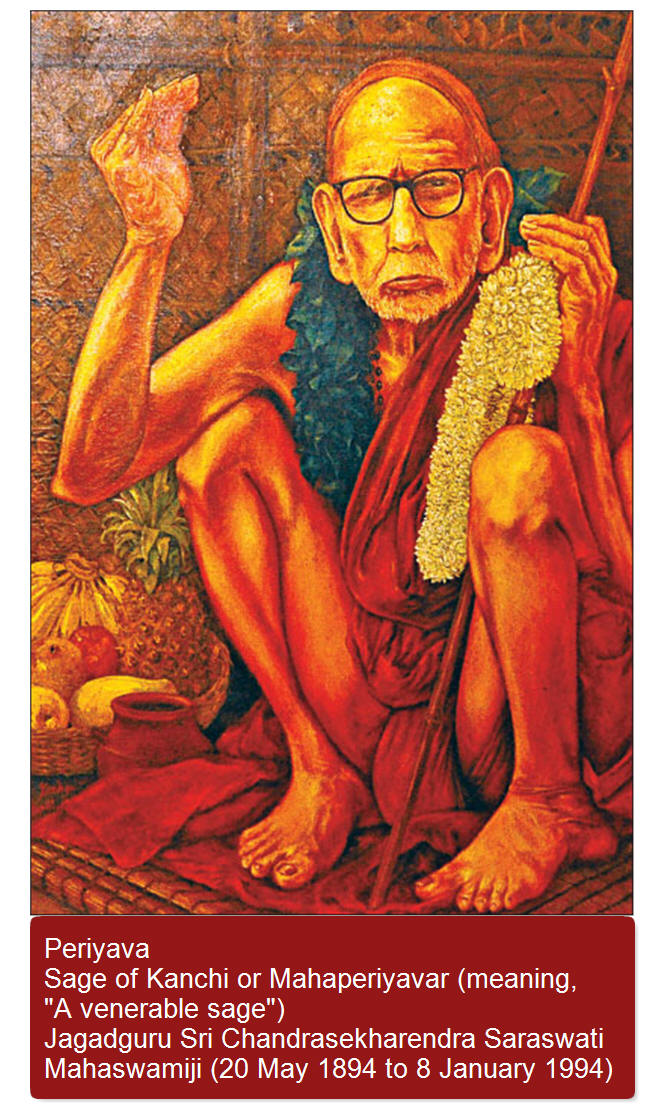By Periyava
Translation from Tamil by V. Krishnaraj
கர்ம யோகம் : தெய்வத்தின் குரல் (முதல் பகுதி)
Karma yogam: Deivathin Kural Part One
http://www.kamakoti.org/tamil/part1kural93.htm

Arjuna’s question was, “Is it not sin to kill family and friends?” To us Arjuna’s stand appears proper and justified. Srī Krishna Paramātma in Bhagavadgita gives a different answer. In the perspective of the world, a deed can appear bad or cruel. Because of it, it may not be a sin. For the welfare of the world, there may be a need for cruelty. Then it is not sin. This is the answer Bhagavan gives. If so, which is sin and which is merit? Bhagavan gives answer to this also. If a deed is done from desire, anger and or hate, those deeds earn sin to the doer. The deeds performed without desire, anger and or hate for the welfare of the world, though they may appear cruel, are meritorious. This is the answer given by the Gita.
You may wonder whether a horrendous act can be done without desire, anger and or hate. I will give you an illustration. When a judge passes his judgement (punishment) on a criminal defendant, does he have any personal interest, desire or hate? Dealing punishment may appear cruel. That punishment is imposed for the welfare of his soul and the world.
Sāstraic injunctions prohibit certain acts. These injunctions do good to us and the world. Krishna Paramātmā says in Bhagavadgita we should perform acts according to Sastras. He says in Bhagavadgita verse 16.24 the following.
tasmāt1 śāstram2 pramāṇam3 te4 kārya-akārya-vyavasthitau5
jñātvā6 śāstra-vidhāna-uktam7 karma8 kartum9 iha10 arhasi11 (Verse 16.24)
16.24: Therefore, let śāstra be your authority in knowing the difference between proper and prohibited action. Know the declared scriptural precepts and do your work (accordingly in this world).
Bhagavan Krishna says the authority in determining ‘which is a worthy act and which is not a worthy act’ rests with the Sastras. Giving up doing deeds according to his whim and fancy, everyone should do acts according to the precepts of the Sastras.
Gita is well-known and longed for all over the world. The nonbelievers in Sastras, the researchers, the white people talk highly about Bhagavadgita. They offer disparate explanations of Svadharma (one’s own duty), wherein each individual should work according to his hereditary vocation. In Gita, the assertion beyond doubt is that everyone must work in a vocation as prescribed by Sastras.
Absence of selfish desire and hatred engenders no antipathy in anyone doing any deed, which facilitates doing the work with love and living with happiness.
Ahaṅkāram causes desire and hatred. Once egoism is abandoned, there is no feeling of superiority or inferiority in the mix of hereditary vocations. We will be disposed to do our sastra-assigned vocations as duty with feelings and happiness. The world will be a happy place. There is no self-conceit in the spirit of performance of one’s duty and dedication of the fruits at the feet of Isvara. Gita says that in Karmayoga. Without personal like or dislike, do the work in the interest of world welfare. The culture of cultivating purity of the soul has thrived since time immemorial. Sri Krishna Paramātmā has done us a favor by offering this culture to us in the handy jewel case.
We should investigate and elucidate this advice as it applies to every deed we perform. Does this deed beget personal profit, name and fame? Is there desire? Is there hate? Is there favoritism? If they are present and if it appears noble in external appearance, that deed is sinful. Any work designed and accomplished to satisfy our desire has faults and flaws. Follow Sastra by word, deed and pledge. When you entertain equality in love (to all) and purity of thought in performance of your Karma (according to Sastras), there will be no competition, jealousy, fight, and disputes in the community. The world will be all bliss. Hex={DE,B8,87}